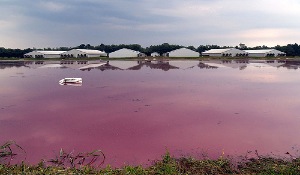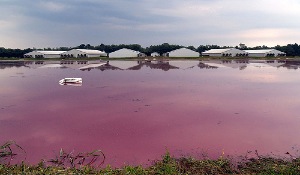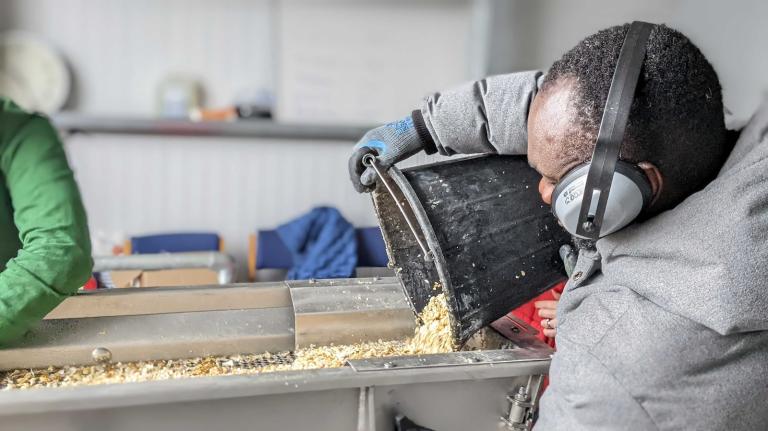 North Catolina hog-waste lagoon: Smells like CAFO spiritDefMoIn one of the most deliciously perverse (not to say Orwellian) twists in our deliciously perverse (not to say Orwellian) system that is US agricultural policy, the prime beneficiaries of one of the USDA’s main environmental programs are beef, pork, and poultry factory farms. This money, of course, comes on top of the monetary benefit that these vast (literal) cesspools of industry reap from an almost total lack of government oversight (a benefit which the GAO has estimated to be in the billions of dollars). Even subsidies to corn and soy farmers could be thought of us sops to the meat industry — by holding prices below the cost of production, commodity payments saved factory livestock farms some $35 billion between 1997 and 2005, according to a 2007 Tufts study (PDF).
North Catolina hog-waste lagoon: Smells like CAFO spiritDefMoIn one of the most deliciously perverse (not to say Orwellian) twists in our deliciously perverse (not to say Orwellian) system that is US agricultural policy, the prime beneficiaries of one of the USDA’s main environmental programs are beef, pork, and poultry factory farms. This money, of course, comes on top of the monetary benefit that these vast (literal) cesspools of industry reap from an almost total lack of government oversight (a benefit which the GAO has estimated to be in the billions of dollars). Even subsidies to corn and soy farmers could be thought of us sops to the meat industry — by holding prices below the cost of production, commodity payments saved factory livestock farms some $35 billion between 1997 and 2005, according to a 2007 Tufts study (PDF).
Still, the $125 million dollars pocketed annually by factory farms from the Environmental Quality Incentives Program stands out as one of the greatest redirections (if not outright misappropriations) of government funds intended to, you know, improve the environment. Because what do these cesspool factories spend the money on, but their cesspools. Or rather, their “manure management” systems. Yes, these operators are shocked, shocked to discover that they’re drowning in a metropolis of sh*t. Who better than the government to lend a hand.
For the record, EQIP was not designed with such an Orwellian bent. The program’s web page states:
The Environmental Quality Incentives Program (EQIP) was reauthorized in the Farm Security and Rural Investment Act of 2002 (Farm Bill) to provide a voluntary conservation program for farmers and ranchers that promotes agricultural production and environmental quality as compatible national goals. EQIP offers financial and technical help to assist eligible participants install or implement structural and management practices on eligible agricultural land.
It’s only in the world of Big Ag that you can create industrial operations with no regard for health, the environment or (lest we forget) the animals themselves and then ask the government literally to clean up the mess. All that matters is protein at the cheapest possible price — and when that’s the only consideration, this is the logic that follows.
If there is any good news, it’s that the USDA is revising the rule under which farms can qualify for EQIP payments — and the comment period for the new rule ends Friday, April 17. Dave Murphy of Food Democracy Now encourages people to submit a comment to end what he calls the “factory farm bailout.” FDN’s recommendations include the following:
- Clarify EQIP, in accordance with the 2008 Farm Bill, such that assistance is available to all farmers and ranchers for comprehensive whole farm conservation planning.
- Create a separate funding pool for organic conversions and make clear that the current organic payment limits appy only to organic conversion payments and not to all EQIP payments made to organic farmers and ranchers.
- Amend the EQIP rule to prohibit funding for animal waste storage, treatment or transportation for new or expanding CAFOs and prohibit waivers to increase payments to CAFOs above the $300,000 limit.
Huge changes in ag policy are needed to face the challenges ahead (more on that later) but ending the most egregious examples of abuse is a good place to start.



